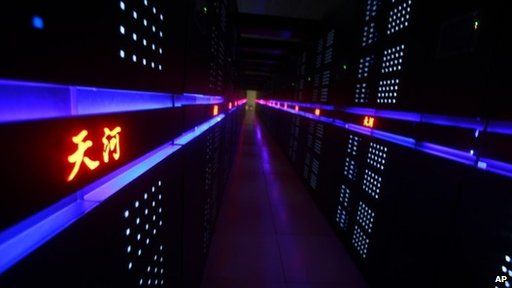
-
3 August 2015
- From the section Technology

National security concerns have led China to restrict exports of high-performance drones and supercomputers.
The new regulations cover drones that can stay airborne for longer than an hour, handle bad weather and reach altitudes of 1 mile (1.5km).
They also limit the export of computer hardware supporting processing speeds of eight teraflops a second or more.
The moves come soon after the US clamped down on the computer hardware that firms can sell to China.
Computer power
The restrictions were announced in an official statement issued by China’s Ministry of Commerce and its Customs Office. The announcement did not make clear how the technologies were a threat to national security.
It means that companies selling the hardware must apply for a licence before exporting them.
However, the conditions effectively exempt commercial drones which typically have a battery life of about 30 minutes, struggle to reach high altitude and cannot fly in strong winds.
Chinese companies such as DJI, which sell drones to hobby flyers, would not be hit by the new rules, a spokesman for the firm told the Wall Street Journal.
The rules on supercomputer hardware cover equipment used to build machines that would be among the most powerful in the world.
China’s Tianhe-2 supercomputer currently tops the list of the world’s biggest supercomputers and has a top processing speed of about 34 petaflops (33,862 teraflops). A petaflop is equal to about one quadrillion calculations per second.
The Tianhe-2 uses 80,000 Intel Xeon chips to generate a computational capacity of more than 33 petaflops. The chips are arranged in processing units that can individually handle trillions of calculations (teraflops) a second.
In April this year, the US stopped Intel working with China on a supercomputer that, once built, would be more powerful than Tianhe-2. The US Department of Commerce said it was concerned that the machine would be used for nuclear weapons research.
Soon afterwards, Intel signed a $200m (£136m) deal with the US government to build a massive supercomputer at one of its own national laboratories.
The ban led China to beef up its efforts to produce powerful home-grown computer chips that it can use in Tianhe-2’s successor.
China’s export restrictions are expected to come into force in mid-August.
